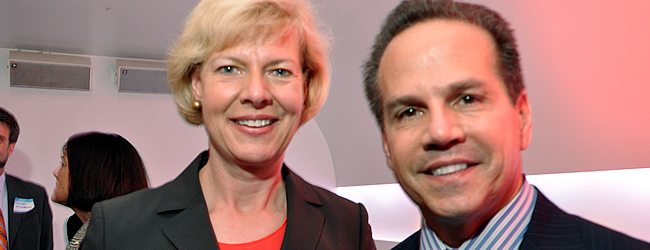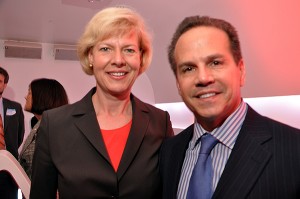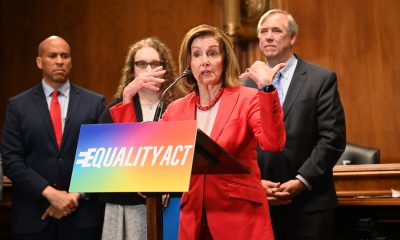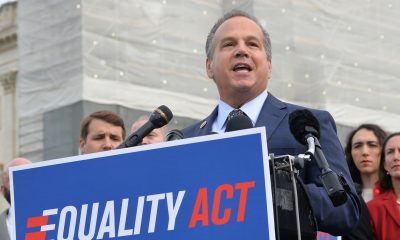National
Cicilline victory gives Congress 4th gay member
Gay Providence mayor wins House seat; Pougnet falls short in Calif.


U.S. Rep. Tammy Baldwin and Rhode Island Mayor David Cicilline who won a Congressional seat Tuesday. (Blade photo by Michael Key)
The election of an openly gay Rhode Island politician to the U.S. House proved one of the few bright spots on Election Day for the LGBT community.
David Cicilline, who’s gay and the mayor of Providence, R.I., defeated his Republican opponent, John Loughlin, a Rhode Island State Assembly member.
According to the Rhode Island Board of Elections, Cicilline won by taking 50.6 percent of vote in the state’s 1st congressional district while Loughlin earned 44.6 percent.
“I am thrilled to be the next Congressman from Rhode Island’s First District and so grateful to the members of the LGBT community who supported my campaign,” Cicilline said. “I look forward to going to Washington and fighting for the issues important to all of us — creating good jobs, protecting Social Security, working to fight global climate change and, of course, fighting for full equality for our community.”
Chuck Wolfe, CEO for the Victory Fund, commended Cicilline for his victory in a statement.
“Mayor Cicilline will be a strong advocate for all Rhode Islanders, but he will also be an authentic voice for the millions of gay, lesbian, bisexual and transgender Americans who long for the day when we will be treated equally under law,” Wolfe said. ”We are enormously proud of him and grateful to Rhode Island voters.”
Cicilline’s election positions him to become the fourth sitting openly gay member of the U.S. House when the 112th Congress begins in January. He’ll succeed Rep. Patrick Kennedy (D-R.I.), who’s retiring from Congress at the end of this year. Gay Reps. Jared Polis (D-Colo.), Barney Frank (D-Mass.) and Tammy Baldwin (D-Wisc.) all won re-election Tuesday.
The Providence mayor was favored to win because he was running in a Democratic stronghold and was a powerhouse fundraiser. According to Federal Election Commission reports, Cicilline raked in nearly $1.7 million over the course of his campaign.
Cicilline earned the endorsement of many national LGBT organizations, including the Human Rights Campaign and the Victory Fund.
In a statement, Michael Cole, an HRC spokesperson, said he’s “thrilled” that Cicilline will join the members of Congress who are openly gay.
“No doubt he will carry on the record of retiring Rep. Patrick Kennedy in ensuring Rhode Island’s first district is represented by an effective congressman in promoting equality for all people,” Cole said.
Signs showed the race was tightening in the week before the election. While earlier polls showed Cicilline ahead of Loughlin by double-digit numbers, the lead dropped to single digits in some polls the week before the campaign.
The Loughlin campaign also engaged in what could be seen as gay-baiting in the weeks before the election. Loughlin ran ads emphasizing that he’s a husband and a father — possibly a reference to the fact that Cicilline is gay and single — and defended “Don’t Ask, Don’t Tell” during a debate.
The news wasn’t as good for other openly gay candidates seeking election to Congress. Both were Democratic candidates who faced the challenge of unseating incumbent Republicans in traditionally GOP districts during an election that was seen as a Republican wave.
Steve Pougnet, who’s gay and mayor of Palm Springs, Calif., lost his bid to unseat six-term incumbent Rep. Mary Bono Mack (R-Calif.).
According to the California secretary of state’s website, with 445 of 624 precincts reporting, Bono Mack claimed 51.5 percent of the vote compared to the 42.1 percent of the vote earned by Pougnet. A third-party conservative candidate, Bill Lussenheide, won 6.4 percent of the vote.
Prior to the start of this Congress, Bono Mack had the support of many in the LGBT community for voting twice against the Federal Marriage Amendment. She also supported hate crimes legislation as well as a version of the Employment Non-Discrimination Act.
But the Republican lawmaker’s vote this year against “Don’t Ask, Don’t Tell” repeal earned the rancor of many LGBT people. Others in the LGBT community also flocked to Pougnet because his election would have made him the first person in a same-sex marriage and the first gay father elected to Congress.
Pougnet lost the race even though he managed to be on par with Bono Mack in terms of fundraising throughout much of the campaign. According to the FEC, the Democratic candidate raised nearly $1.7 million while Bono Mack raked in more than $2.2 million.
Both HRC and the Victory Fund had endorsed Pougnet in his bid and expressed disappointment in his loss on Election Day.
Cole said Pougnet’s loss is sad not just for his district, but for Congress because the body “needs more voices like him.”
“Pougnet would have been the first gay parent to serve in Congress but remains a leader in our community and a powerful force for equality,” Cole said.
On the other side of the country, Ed Potosnak, a schoolteacher and former staffer for Rep. Mike Honda (D-Calif.), lost his bid to unseat Rep. Leonard Lance (R-N.J.), a one-term incumbent.
According to the Westfield Ledger newspaper, with all but one precinct reporting, Lance claimed 59 percent of votes to defeat the gay Democratic challenger.
Potosnak’s chances of winning were widely seen as slim. Neither HRC nor the Victory Fund endorsed him in the race. Still, the candidate received an endorsement from the National Stonewall Democrats.
Michael Mitchell, Stonewall’s executive director, said Potosnak ran a “solid, clean campaign” that focused on education and business growth.
“As a teacher and small business owner, Ed knows firsthand the struggles of the constituents of the district, something that his opponent Leo Lance has forgotten, given that he spoke about jobs on the House floor for under two minutes during the entire 110th Congress,” Mitchell said.
In addition to Cicilline, the Victory Fund announced that more openly LGBT candidates won election to public office than in any other year. The group, which works to elect openly LGBT candidates, said at least 106 of its 164 endorsed candidates won their races.
Specifically, Victory Fund celebrated wins by Jim Gray as mayor of Lexington, Ken.; Nickie Antonio as the first openly gay member of the Ohio House; Marcus Brandon as the only out gay state lawmaker in North Carolina; and three newcomers in Maryland who boosted the state’s openly gay and lesbian delegation to seven.
Iowa justices ousted
While celebrating the victories of openly gay candidates around the country, LGBT advocates expressed disappointment and concern after three state Supreme Court justices who ruled in favor of same-sex marriage rights in Iowa were ousted by voters.
The anti-gay group National Organization for Marriage spent $600,000 on TV ads and a statewide bus tour in an effort to remove the justices, an effort decried as an attempt to intimidate justices across the country.
“By their own admission, NOM’s Iowa strategy was about sending a warning shot to judges nationwide,” said HRC President Joe Solmonese. “NOM and its secret donors will continue to target judges around the country if they rule in favor of marriage equality and will foster an anti-gay, hostile environment in the process.”
Federal Government
HHS to retire 988 crisis lifeline for LGBTQ youth
Trevor Project warns the move will ‘put their lives at risk’

The U.S. Department of Health and Human Services is planning to retire the national 988 crisis lifeline for LGBTQ youth on Oct. 1, according to a preliminary budget document obtained by the Washington Post.
Introduced during the Biden-Harris administration in 2022, the hotline connects callers with counselors who are trained to work with this population, who are four times likelier to attempt suicide than their cisgender or heterosexual counterparts.
“Suicide prevention is about risk, not identity,” said Jaymes Black, CEO of the Trevor Project, which provides emergency crisis support for LGBTQ youth and has contracted with HHS to take calls routed through 988.
“Ending the 988 Suicide and Crisis Lifeline’s LGBTQ+ youth specialized services will not just strip away access from millions of LGBTQ+ kids and teens — it will put their lives at risk,” they said in a statement. “These programs were implemented to address a proven, unprecedented, and ongoing mental health crisis among our nation’s young people with strong bipartisan support in Congress and signed into law by President Trump himself.”
“I want to be clear to all LGBTQ+ young people: This news, while upsetting, is not final,” Black said. “And regardless of federal funding shifts, the Trevor Project remains available 24/7 for anyone who needs us, just as we always have.”
The service for LGBTQ youth has received 1.3 million calls, texts, or chats since its debut, with an average of 2,100 contacts per day in February.
“I worry deeply that we will see more LGBTQ young people reach a crisis state and not have anyone there to help them through that,” said Janson Wu, director of advocacy and government affairs at the Trevor Project. “I worry that LGBTQ young people will reach out to 988 and not receive a compassionate and welcoming voice on the other end — and that will only deepen their crisis.”
Under Trump’s HHS secretary, Robert F. Kennedy, Jr., the agency’s departments and divisions have experienced drastic cuts, with a planned reduction in force of 20,000 full-time employees. The Substance Abuse and Mental Health Services Administration has been sunset and mental health services consolidated into the newly formed Administration for a Healthy America.
The budget document reveals, per Mother Jones, “further sweeping cuts to HHS, including a 40 percent budget cut to the National Institutes of Health; elimination of funding for Head Start, the early childhood education program for low-income families; and a 44 percent funding cut to the Centers for Disease Control, including all the agency’s chronic disease programs.”
U.S. Supreme Court
Supreme Court hears oral arguments in LGBTQ education case
Mahmoud v. Taylor plaintiffs argue for right to opt-out of LGBTQ inclusive lessons

The U.S. Supreme Court on Tuesday heard oral arguments in Mahmoud v. Taylor, a case about whether Montgomery County, Md., public schools violated the First Amendment rights of parents by not providing them an opportunity to opt their children out of reading storybooks that were part of an LGBTQ-inclusive literacy curriculum.
The school district voted in early 2022 to allow books featuring LGBTQ characters in elementary school language arts classes. When the county announced that parents would not be able to excuse their kids from these lessons, they sued on the grounds that their freedom to exercise the teachings of their Muslim, Jewish, and Christian faiths had been infringed.
The lower federal courts declined to compel the district to temporarily provide advance notice and an opportunity to opt-out of the LGBTQ inclusive curricula, and the 4th U.S. Circuit Court of Appeals determined that the parents had not shown that exposure to the storybooks compelled them to violate their religion.
“LGBTQ+ stories matter,” Human Rights Campaign President Kelley Robinson said in a statement Tuesday. “They matter so students can see themselves and their families in the books they read — so they can know they’re not alone. And they matter for all students who need to learn about the world around them and understand that while we may all be different, we all deserve to be valued and loved.”
She added, “All students lose when we limit what they can learn, what they can read, and what their teachers can say. The Supreme Court should reject this attempt to silence our educators and ban our stories.”
GLAD Law, NCLR, Family Equality, and COLAGE submitted a 40-page amicus brief on April 9, which argued the storybooks “fit squarely” within the district’s language arts curriculum, the petitioners challenging the materials incorrectly characterized them as “specialized curriculum,” and that their request for a “mandated notice-and-opt-out requirement” threatens “to sweep far more broadly.”
Lambda Legal, the Leadership Conference on Civil and Human Rights, PFLAG, and the National Women’s Law Center announced their submission of a 31-page amicus brief in a press release on April 11.
“All students benefit from a school climate that promotes acceptance and respect,” said Karen Loewy, senior counsel and director of constitutional law practice at Lambda Legal. “Ensuring that students can see themselves in the curriculum and learn about students who are different is critical for creating a positive school environment. This is particularly crucial for LGBTQ+ students and students with LGBTQ+ family members who already face unique challenges.”
The organizations’ brief cited extensive social science research pointing to the benefits of LGBTQ-inclusive instruction like “age-appropriate storybooks featuring diverse families and identities” benefits all students regardless of their identities.
Also weighing in with amici briefs on behalf of Montgomery County Public Schools were the National Education Association, the ACLU, and the American Psychological Association.
Those writing in support of the parents challenging the district’s policy included the Center for American Liberty, the Manhattan Institute, Parents Defending Education, the Alliance Defending Freedom, the Trump-Vance administration’s U.S. Department of Justice, and a coalition of Republican members of Congress.
U.S. Supreme Court
LGBTQ groups: SCOTUS case threatens coverage of preventative services beyond PrEP
Kennedy v. Braidwood oral arguments heard Monday

Following Monday’s oral arguments before the U.S. Supreme Court in Kennedy v. Braidwood Management, Inc., LGBTQ groups issued statements warning the case could imperil coverage for a broad swath of preventative services and medications beyond PrEP, which is used to reduce the risk of transmitting HIV through sex.
Plaintiffs brought the case to challenge a requirement that insurers and group health plans cover the drug regimen, arguing that the mandate “encourage[s] homosexual behavior, intravenous drug use, and sexual activity outside of marriage between one man and one woman.”
The case has been broadened, however, such that cancer screenings, heart disease medications, medications for infants, and several other preventive care services are in jeopardy, according to a press release that GLAAD, Lambda Legal, PrEP4All, Harvard Law’s Center for Health Law and Policy Innovation (CHLPI), and the Center for HIV Law and Policy (CHLP) released on Monday.
The Trump-Vance administration has argued the independent task force responsible for recommending which preventative services must be covered with no cost-sharing for patients is constitutional because the secretary of the U.S. Department of Health and Human Services can exercise veto power and fire members of the volunteer panel of national experts in disease prevention and evidence-based medicine.
While HHS secretaries have not exercised these powers since the Affordable Care Act was passed in 2010, Braidwood could mean Trump’s health secretary, Robert F. Kennedy Jr., takes a leading role in determining which services are included in the coverage mandate.
Roll Call notes the Supreme Court case comes as the administration has suspended grants to organizations that provide care for and research HIV while the ongoing restructuring of HHS has raised questions about whether the “Ending the HIV Epidemic” begun under Trump’s first term will be continued.
“Today’s Supreme Court hearing in the Braidwood case is a pivotal moment for the health and rights of all Americans,” said GLAAD President Sarah Kate Ellis. “This case, rooted in discriminatory objections to medical necessities like PrEP, can undermine efforts to end the HIV epidemic and also jeopardize access to essential services like cancer screenings and heart disease medications, disproportionately affecting LGBTQ people and communities of color.”
She added, “Religious exemptions should not be weaponized to erode healthcare protections and restrict medically necessary, life-saving preventative healthcare for every American.”
Lambda Legal HIV Project Director Jose Abrigo said, “The Braidwood case is about whether science or politics will guide our nation’s public health policy. Allowing ideological or religious objections to override scientific consensus would set a dangerous precedent. Although this case began with an attack on PrEP coverage, a critical HIV prevention tool, it would be a serious mistake to think this only affects LGBTQ people.”
“The real target is one of the pillars of the Affordable Care Act: The preventive services protections,” Abrigo said. “That includes cancer screenings, heart disease prevention, diabetes testing, and more. If the plaintiffs succeed, the consequences will be felt across every community in this country, by anyone who relies on preventive care to stay healthy.”
He continued, “What’s at stake is whether we will uphold the promise of affordable and accessible health care for all or allow a small group of ideologues to dismantle it for everyone. We as a country are only as healthy as our neighbors and an attack on one group’s rights is an attack on all.”
PrEP4All Executive Director Jeremiah Johnson said, “We are hopeful that the justices will maintain ACA protections for PrEP and other preventive services, however, advocates are poised to fight for access no matter the outcome.”
He continued, “Implementing cost-sharing would have an enormous impact on all Americans, including LGBTQ+ individuals. Over 150 million people could suddenly find themselves having to dig deep into already strained household budgets to pay for care that they had previously received for free. Even small amounts of cost sharing lead to drops in access to preventive services.”
“For PrEP, just a $10 increase in the cost of medication doubled PrEP abandonment rates in a 2024 modeling study,” Johnson said. “Loss of PrEP access would be devastating with so much recent progress in reining in new HIV infections in the U.S. This would also be a particularly disappointing time to lose comprehensive coverage for PrEP with a once every six month injectable version set to be approved this summer.”
“Today’s oral arguments in the Braidwood case underscore what is at stake for the health and well-being of millions of Americans,” said CHLPI Clinical Fellow Anu Dairkee. “This case is not just about legal technicalities — it is about whether people across the country will continue to have access to the preventive health services they need, without cost sharing, regardless of who they are or where they come from.”
She continued, “Since the Affordable Care Act’s preventive services provision took effect in 2010, Americans have benefited from a dramatic increase in the use of services that detect disease early, promote healthy living, and reduce long-term health costs. These benefits are rooted in the work of leading scientists and public health experts, including the U.S. Preventive Services Task Force, whose recommendations are based on rigorous, peer-reviewed evidence.”
“Any shift away from cost-free access to preventive care could have wide-ranging implications, potentially limiting access for those who are already navigating economic hardship and health disparities,” Dairkee said. “If Braidwood prevails, the consequences will be felt nationwide. We risk losing access to lifesaving screenings and preventive treatments that have become standard care over the past decade.”
“This case should serve as a wake-up call: Science, not politics, must guide our health care system,” she said. “The health of our nation depends on it.”
“We are grateful for the Justices who steadfastly centered constitutionality and didn’t allow a deadly political agenda to deter them from their job at hand,” said CHLP Staff Attorney Kae Greenberg. “While we won’t know the final decision until June, what we do know now is not having access to a full range of preventative healthcare is deadly for all of us, especially those who live at the intersections of racial, gender and economic injustice.”
“We are crystal clear how the efforts to undermine the ACA, of which this is a very clear attempt, fit part and parcel into an overall agenda to rollback so much of the ways our communities access dignity and justice,” he said. “Although the plaintiffs’ arguments today were cloaked in esoteric legal language, at it’s heart, this case revolves around the Christian Right’s objection to ‘supporting’ those who they do not agree with, and is simply going to result in people dying who would otherwise have lived long lives.”
“This is why CHLP is invested and continues in advocacy with our partners, many of whom are included here,” Greenberg said.
-

 Federal Government3 days ago
Federal Government3 days agoHHS to retire 988 crisis lifeline for LGBTQ youth
-

 Opinions3 days ago
Opinions3 days agoDavid Hogg’s arrogant, self-indulgent stunt
-

 District of Columbia3 days ago
District of Columbia3 days agoD.C. police seek help in identifying suspect in anti-gay threats case
-

 Virginia3 days ago
Virginia3 days agoGay talk show host wins GOP nom for Va. lieutenant guv












